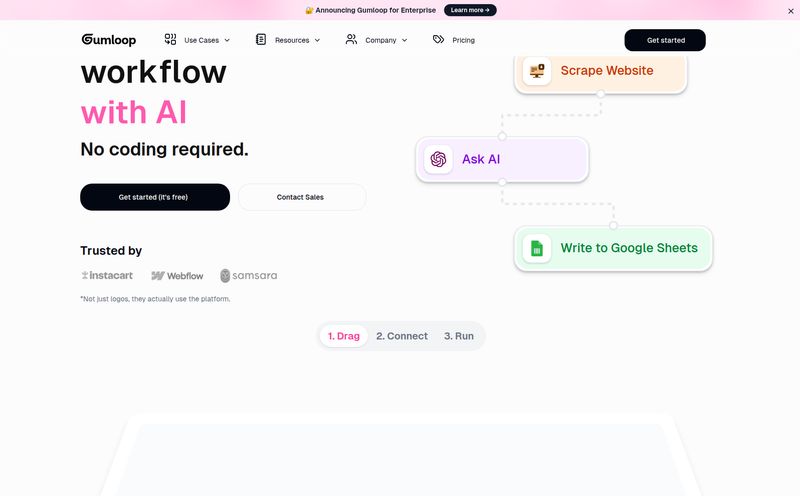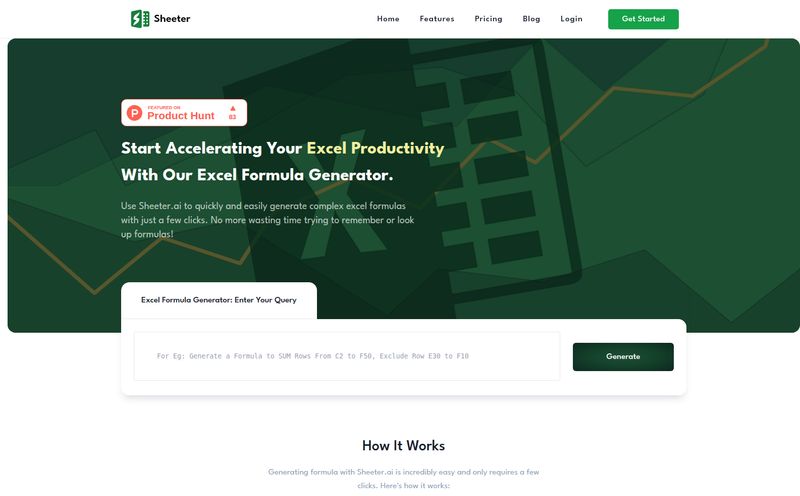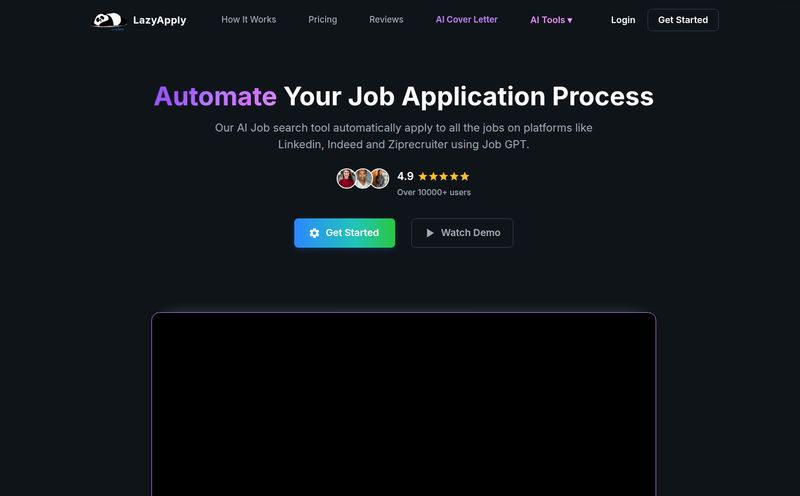As someone who’s been neck-deep in SEO and CPC for years, I've seen my share of tools come and go. Some are brilliant, some are duds, and some... well, some just vanish into the digital ether. Today, I want to talk about one of the latter: a platform called PromptBoost.
I’ve been on a kick lately, really digging into prompt engineering. It's the new frontier, isn't it? We all have access to these incredibly powerful AI models, but getting them to give you gold instead of gibberish is an art form. It feels less like typing and more like whispering instructions to a genie. You have to be specific, you have to provide context, you have to know just how to phrase things. It’s basically SEO for robots, and I’m here for it.
So, when I stumbled upon the name PromptBoost, my interest was piqued. The promise was tantalizing: a platform to help you create, manage, and optimize your AI prompts for better results. Sounds perfect, right? I went to check it out, and… this is what I found.

Visit PromptBoost
A 404 error. A 'DEPLOYMENT_NOT_FOUND' message. A digital dead end. Is it a ghost? A project that was retired before it even launched? Honestly, it just makes the whole thing more intriguing. So, let’s go on a bit of an archaeological dig. Based on the digital fossils I could find, let's piece together what PromptBoost was supposed to be and why the idea of it is still so incredibly relevant.
What Exactly Was PromptBoost Meant to Be?
From what I've gathered, PromptBoost wasn't just another text editor. It was designed to be an intelligent partner in your AI conversations. Think of it as a workbench for your prompts. The core idea was to stop the endless cycle of copy-pasting slightly different prompts into a chatbot window, hoping one of them sticks. Instead, it offered a structured environment to refine your inputs before they ever reached the AI.
It aimed to transform how we talk to AI, moving from clumsy guesswork to a more scientific, repeatable process. And frankly, anyone who has tried to get an AI to write a decent meta description or generate a list of LSI keywords knows that guesswork can be a massive time-sink.
Why Prompt Optimization is a Skill You Need Yesterday
Let’s back up. Why do we even need a tool like this? It comes down to a classic computing principle: garbage in, garbage out.
An AI model is like an incredibly gifted, but extremely literal, junior assistant. If you say, “Write an article about cars,” you’ll get a generic, soulless piece of text. But if you say, “Write a 1,200-word blog post in a friendly, conversational tone for an audience of first-time car buyers. Focus on the pros and cons of buying a new vs. used car, and include a section on negotiating with dealerships. Use H2 and H3 headings,”… now you’re getting somewhere.
That detailed instruction is a prompt. And building it is prompt engineering. It's a skill that requires a mix of creativity, logic, and a deep understanding of what you want the final output to be. A dedicated tool to help with this? Yes, please.
The Promised Land of PromptBoost Features
So what was this phantom platform supposed to do? The breadcrumbs point to a few key features that had me nodding my head in approval.
Intelligent Prompt Optimization
This was the big one. The platform claimed it could intelligently enhance your prompts. I imagine this as something like a Yoast SEO for AI prompts. You'd type in your base idea, and it might suggest adding a specific tone, a target audience, a negative constraint (e.g., "don't mention brand X"), or a particular format for the output. This could seriously cut down on the trial-and-error that eats up so much time.
Tools for Prompt Variation
This is where my CPC brain gets excited. In advertising, you never run just one ad. You run multiple variations to see what works best. PromptBoost apparently offered tools for creating and testing these variations. Imagine being able to create five slightly different prompts for a product description, send them all to the AI, and easily compare the outputs side-by-side. That’s not just convenient; it’s how you find the golden ticket.
A Workspace for Prompt Management
My current system for saving good prompts is a chaotic mess of Google Docs, notes apps, and text files named things like `final_prompt_v3_USE_THIS_ONE.txt`. It's a disaster. The idea of an 'intuitive workspace' to save, categorize, and organize prompts is, for me, the most exciting feature. Having a searchable library of your greatest hits, ready to be deployed or adapted at a moment’s notice? That’s not just a feature; it's a sanity-saver.
The Potential Highs and The Gritty Lows
Every tool has its potential pitfalls, and even in its ghostly form, we can speculate on what they might have been for PromptBoost.
On the plus side, the benefits are obvious. Better, more relevant AI responses mean higher quality content, faster workflows, and more creative outputs. The included templates and guides could have been a fantastic on-ramp for people new to prompt crafting, demystifying the whole process.
However, there are always trade-offs. A platform like this would likely have a learning curve. You're not just learning the tool; you're learning the skill of prompt engineering itself. Also, a tool's effectiveness is completely dependent on the AI model it's connected to. A perfectly crafted prompt sent to a weak AI will still produce a weak result. One of the biggest question marks was which specific AI models it would support—was it just for OpenAI's GPT family, or would it work with Claude, Gemini, and others? We may never know.
The quality of your AI output is a direct reflection of the quality of your input. The future belongs to those who can ask the right questions."The Million-Dollar Question: What About Pricing?
Unsurprisingly, given the 404 error, information on pricing is nonexistent. This could mean anything. Maybe it was intended to be a free beta project. Perhaps it was being developed as a premium, subscription-based SaaS product. Or maybe it was going to be one feature within a larger suite of marketing tools. The mystery continues.
So, Where Do We Go From Here? Alternatives for the Aspiring Prompt Engineer
While PromptBoost itself may be a ship that sailed (or sank), the need for it is stronger than ever. So what can you do right now?
- Build Your Own Swipe File: Be disciplined! When you craft a prompt that gives you amazing results, save it. Use a tool like Notion or even a simple Google Sheet. Note down the prompt, the AI you used, and what made the output so good.
- Learn Prompting Formulas: Look up frameworks like `RTF` (Role, Task, Format) or `CARE` (Context, Action, Result, Example). These structures provide a solid foundation for building effective prompts.
- Explore Existing Tools: While I was looking for PromptBoost, I saw some other names floating around. I haven't tested them all extensively, but you might look into platforms that offer similar features. Always do your own research, of course.
The key takeaway isn't about one specific tool. It's about recognizing that interacting with AI is a skill worth developing. It's the new literacy, and getting good at it will give you a serious edge.
Visit PromptBoost Frequently Asked Questions about Prompt Optimization
- What is prompt engineering?
- Prompt engineering is the process of structuring text and instructions to be interpreted and understood by a generative AI model. It's the art and science of asking the right questions to get the best possible answers from an AI.
- Why are my AI results often generic or unhelpful?
- This is usually due to a lack of context and specificity in your prompt. The more detail you provide—about the desired tone, format, audience, and constraints—the better your output will be. Vague prompts lead to vague results.
- Is PromptBoost available now?
- Based on our findings, it appears PromptBoost is not currently available. The official links lead to a 'deployment not found' error, suggesting the project is offline or was never fully launched.
- Do I really need a tool to write prompts?
- Need? No. But it can make you vastly more efficient. A good prompt management tool helps with organization, inspiration, and iteration, saving you time and improving the consistency of your results, much like how a code editor helps a developer.
- What's the single best tip for writing better prompts?
- Assign the AI a role. Don't just ask it to write something. Tell it: "Act as an expert SEO consultant..." or "You are a witty copywriter for a Gen Z audience..." Giving the AI a persona to adopt dramatically improves the quality and relevance of the response.
- Will AI tools replace SEO professionals?
- I get this one a lot. My take? No. They will replace SEO professionals who don't use AI tools. It's a powerful assistant, not a replacement for strategy, critical thinking, and human experience.
Final Thoughts on a Tool That Might Have Been
So, PromptBoost remains an enigma. A great idea, a few digital breadcrumbs, and a 404 page. But the search wasn't a waste of time. It reinforces a critical point for anyone in the digital space today: your ability to communicate effectively with AI is becoming one of the most valuable skills you can have. Whether you use a fancy platform, a spreadsheet, or just your own brain, start thinking like a prompt engineer. The robots are listening, so you might as well learn to speak their language.
Reference and Sources
- For general prompting advice, OpenAI's own Prompt Engineering Guide is a fantastic, if technical, starting point.
- I often refer to the concept of "Garbage In, Garbage Out" which you can read more about on its Wikipedia page.



